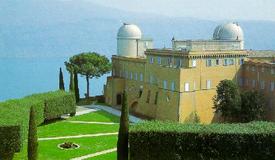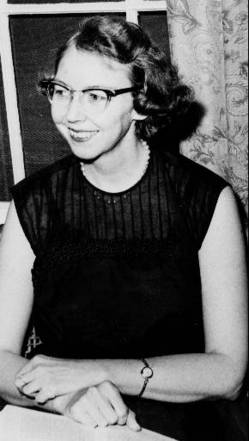Tag: faith and reason
Vatican Observatory Moves
The Jesuit report that after residing
more than seventy years within the papal summer Palace itself, the headquarters of the Vatican Observatory recently moved to a new
location in the Papal Gardens at Castelgandolfo. The move was occasioned by
increased demands for space within the Palace, and the growing needs of the
Observatory. Until few weeks ago, the observatory offices were located on the
top floor of Papal Palace, the Pope’s summer home located in the Alban Hills,
25 kilometers southeast of Rome. Its extensive astronomical library is
scattered over four rooms on the top two floors of the Palace, while the
valuable meteorite collection and laboratory, the historic vault of
photographic observations made at the Observatory from 1895 to 1979, and the
classroom where the biennial Vatican Observatory Summer Schools are conducted,
are located on the ground floor of the Palace. Meanwhile, the living
quarters of the Jesuits is divided between rooms on the second and top floors.
With the prospect of half a dozen younger Jesuits joining the staff over the
next five years, the issue of both residence and office space was becoming
acute.
“Moving the Observatory collections and libraries has been
a logistical challenge,” noted Father José Funes, the Argentinean
Jesuit and director of the observatory. “But the new site will allow us to
address a growing need for space and order.” The new quarters,
located in the remodelled monastery built by the Basilian monks within one of
the most beautiful gardens in the Italian peninsula, should provide a far more
peaceful and comfortable setting. The Vatican Observatory traces its
history to the reform of the calendar by Pope Gregory XIII in 1583. It was
re-organized by Pope Leo XIII in 1891, “so that everyone might see clearly
that the Church and her Pastors are not opposed to true and solid science,
whether human or divine, but that they embrace it, encourage it, and promote it
with the fullest possible devotion.”
The faith needs to be intelligible, Pope says
Using the method of Saint Cyril and Methodius Pope Benedict
spoke about the work of the Church in making the faith intelligible to people
using their own language. The task of inculturation is an extremely difficult
work because of the nuances of language and culture. Just look at the headaches
in translating catechisms, papal speeches and liturgical texts today. The
coalescing of faith and culture is a work the Church has done since the time of
Christ. Watch the video clip on the subject.
The Pope said, in
part:
This was a decisive factor for the development of the Slavic
civilization in general. Cyril and Methodius were convinced that the various
peoples could not consider that they had fully received Revelation until they
had heard it in their own language and read it with the characters proper to
their own alphabet.
To Methodius falls the merit of ensuring that the work
began by his brother would not remain sharply interrupted. While Cyril, the
“philosopher,” tended toward contemplation, he [Methodius] was directed
more toward the active life. In this way, he was able to establish the
foundations of the successive affirmation of what we could call the
“Cyril-Methodian idea,” which accompanied the Slavic peoples in the
various historical periods, favoring cultural, national and religious
development. Pope Pius XI already recognized this with the apostolic letter Quod Sanctum Cyrillum, in which he classified the two brothers as
“sons of the East, Byzantines by their homeland, Greeks by origin, Romans
by their mission, Slavs by their apostolic fruits” (AAS 19 [1927] 93-96).
The historic role that they fulfilled was afterward officially proclaimed by
Pope John Paul II who, with the apostolic letter Egregiae Virtutis
Viri, declared them co-patrons of Europe, together with St. Benedict (AAS
73 [1981] 258-262). Indeed, Cyril and Methodius are a classic example of what
is today referred to with the term “inculturation”: Each people
should make the revealed message penetrate into their own culture, and express
the salvific truth with their own language. This implies a very exacting work
of “translation,” as it requires finding adequate terms to propose
anew the richness of the revealed Word, without betraying it. The two brother
saints have left in this sense a particularly significant testimony that the
Church continues looking at today to be inspired and guided. (Wednesday Audience, June 17, 2009)
Newt Gingrich on his conversion: an interview
Dan Gilgoff of U.S. News & World Report’s “God & Country” blog posted an exclusive interview in which Newt Gingrich speaks on following his desire to enter into full communion with the Roman Catholic Church.
The former Speaker of the House said in part: “The whole effort to create a ruthless, amoral,
situational ethics culture has probably driven me toward a more overt
Christianity.”
To read the interview
Cashing-in the work of the Church
Are we committed to beauty and truth in art? Thinking about
Dan Brown’s books which contains Catholic “material” I have been a bit
distressed at some peoples’ an uncritical acceptance of what I think is mostly
scandalous regarding the Catholic faith. To me it is not OK because Brown is,
as it’s said belowi, cashing in on the work of the Church. But my gripe is that
fiction is always received as such by some people aren’t able to clearly
discern the meaning of things. That is, there are people who can’t separate
fact from fiction in printed materials; for them anything in print is true.
Right, it’s ludicrous but people do think that what Dan Brown writes is true
and beyond reproach. Father John Wauck, an Opus Dei priest, is a professor at
the Pontifical University of the Holy Cross, and the author of the blog
“The Da Vinci Code and Opus Dei” said the following recently in an
interview the rest of the interview was published on Zenit.org.
Dan Brown’s
trying to sell books by offering a “cocktail” of history, art,
religion and mystery, and, in today’s world, there seems to be only one place
where he’s able to find all those things together: in the Roman Catholic
Church. In fact, he’s cashing in on the culture of the Church.
Universities are
an invention of the Church. Copernicus was a Roman Catholic cleric, and he
dedicated his book on the heliocentric universe to the Pope. The calendar we
use today is the Gregorian Calendar, because it was promulgated by Pope Gregory
XIII, who was working with the best astronomers and mathematicians of his time.
Galileo himself always remained a Catholic, and his two daughters were nuns.
One of the greatest Italian astronomers of the 19th century was a Jesuit
priest, Angelo Secchi. The father of modern genetics, Gregor Mendel, was a
Catholic monk. The creator of the “Big Bang” theory was a Belgian
priest, Georges Lemaitre.
In short, the idea that there is a some natural tension between science and the Church, between reason and faith, is utter nonsense. Nowadays, when people hear the words “science” and “the Church,” they immediately think of Galileo’s trial in the 1600s. But, in the larger scheme of things, that complex case –which is frequently distorted by anti-Catholic propagandists–was a glaring exception. There’s a reason why critics of the Church are always brings it up: It’s the only example they’ve got. So, when we hear the words “science” and “the Church,” we should think Copernicus, Secchi, Mendel and Lemaitre. They’re representative. Galileo’s trial is not.
Matteo Ricci: 4th centenary of death
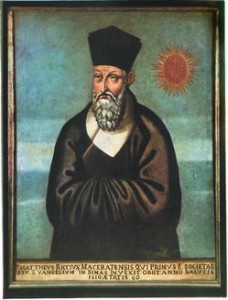 We’re observing the anniversary of death of the famed Jesuit, Matteo Ricci. Benedict XVI wrote to Bishop Claudio Giuliodori of Macerata-Tolentino-Recanati-Cingoli-Treia, Italy on the occasion of a Jubilee Year commemorating the fourth centenary of the death of the Jesuit Father Matteo Ricci, who died in Beijing, China on 11 May 1610. In part the Pope said:
We’re observing the anniversary of death of the famed Jesuit, Matteo Ricci. Benedict XVI wrote to Bishop Claudio Giuliodori of Macerata-Tolentino-Recanati-Cingoli-Treia, Italy on the occasion of a Jubilee Year commemorating the fourth centenary of the death of the Jesuit Father Matteo Ricci, who died in Beijing, China on 11 May 1610. In part the Pope said:
In considering his intense academic and spiritual activity, we cannot but remain favourably impressed by the innovative and unusual skill with which he, with full respect, approached Chinese cultural and spiritual traditions. It was, in fact, this approach that characterised his mission, which aimed to seek possible harmony between the noble and millennial Chinese civilisation and the novelty of Christianity, which is for all societies a ferment of liberation and of true renewal from within, because the Gospel, universal message of salvation, is destined for all men and women whatever the cultural and religious context to which they belong.
A biography of Father Ricci can be read here.
More about Father Ricci can be found here and here.
For those with a deeper curiosity I could recommend Jonathan D. Spence’s The Memory Palace of Matteo Ricci.
Do we believe in a God who liberates us and the world as a place of freedom
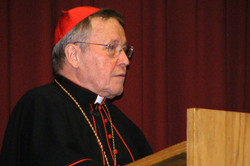 On March 26th, Walter Cardinal Kasper, 76, president of the Pontifical Council for Promoting Christian Unity delivered the annual Fay Vincent Fellowship in Faith and Culture lecture at Saint Thomas More Catholic Chapel & Center at Yale University. The title of his talk was “The Timeliness of Speaking of God: Freedom and Communion as Basic Concepts of Theology.” Here are four salient points in the Cardinal’s address:
On March 26th, Walter Cardinal Kasper, 76, president of the Pontifical Council for Promoting Christian Unity delivered the annual Fay Vincent Fellowship in Faith and Culture lecture at Saint Thomas More Catholic Chapel & Center at Yale University. The title of his talk was “The Timeliness of Speaking of God: Freedom and Communion as Basic Concepts of Theology.” Here are four salient points in the Cardinal’s address:
Reason, Fiction and Faith: a conference on Flannery O’Connor
An International Flannery O’Connor Conference
The April 20-22,
2009 conference was sponsored by the Poetics & Christianity
which is “an international forum for studying the intersection of artistic
culture and expressions of religious faith, with a special emphasis on
narrative and dramatic arts. It offers a meeting place for scholars and artists
of diverse fields of expertise.”
The O’Connor Conference was the 4th gathering
of scholars and other interested parties matters pertaining to art and faith.
Since Flannery O’Connor is relatively unknown in Europe, Father Wauck felt it was time
to introduce the world to writer who lived her Catholic faith and wrote fiction
using Catholic sacramentality. Father Wauck said,
“Flannery O’Connor’s fiction offers an example of what
Catholic art can achieve when it’s fully informed by a sophisticated
theological understanding, a rigorous philosophical background, and also the
kind of dedication to craft, to the artistry of writing that she combined.”
A video clip on the conference can be seen here.
Stanley L. Jaki, OSB, RIP
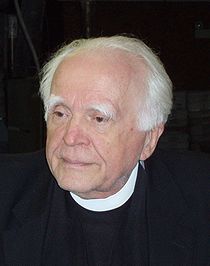 The Reverend Dom Stanley L. Jaki, O.S.B., died April 7th, in Spain after suffering a heart attack in Rome without knowing it. After arriving in Madrid to visit friends he was taken to the hospital for treatment but died days later. He was a monk and priest of the Archabbey of Saint Martin, Pannonhalma, Hungary. He entered the archabbey in 1941, professing solemn vows in 1944 and was ordained a priest in 1948. Like many other Hungarian priests, Jaki immigrated to the USA during Soviet persecution.
The Reverend Dom Stanley L. Jaki, O.S.B., died April 7th, in Spain after suffering a heart attack in Rome without knowing it. After arriving in Madrid to visit friends he was taken to the hospital for treatment but died days later. He was a monk and priest of the Archabbey of Saint Martin, Pannonhalma, Hungary. He entered the archabbey in 1941, professing solemn vows in 1944 and was ordained a priest in 1948. Like many other Hungarian priests, Jaki immigrated to the USA during Soviet persecution.
Father Jaki trained as a physicist and devoted his life to the history and philosophy of science and theology rather than scientific research. His intellectual work was ground breaking in connecting Catholic theology and science, and the only one to do so for many years. Jaki earned a doctorate in theology from Sant’Anselmo (Rome) in 1950 and another doctorate in (astro)physics from Fordham University in 1957. Since 1965 he has taught at Seton Hall University and honored as Distinguished Professor of Physics in 1975. After retiring he kept active by holding court, giving lectures and writing, often cantankerously.
Father Jaki was well-known for his writings on science and religion. He delievered the prestigious Gifford Lectures from 1974-1976, later published under the title of The Road of Science and the Ways to God. In 1987 Dom Stanley was award the Templeton Prize. He is considered one of the best scholars on the thought of Cardinal John Henry Newman in the U.S. His publishing record show he published 7 books and numerous articles on Newman.
“Although the world was God’s creation and, as such, to be profoundly respected, the world itself possessed no intrinsic divinity,” Father Thomas G. Guarino, professor of theology at Seton Hall, stated. “Father Jaki’s work elucidated the notion that in understanding the very laws of the physical universe, science naturally opened out toward the affirmation of faith.”
A website devoted to Father Jaki
Are we living in post-Christian America?
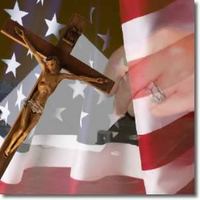 In the April 13, 2009 issue of Newsweek, Jon Meacham wrote the article, “The End of Christian America,” exploring the idea that we are living in a time where many of those who identified themselves as Christians are now saying that they are skeptical about religion. Some have gone beyond skepticism and rejected religion altogether. In his article Meacham points out something that I find startling indeed: since 1990 the percentage of Americans who no longer claim a religious affiliation as risen from 8 to 15%. Plus, this group of religious non-affiliated has risen in the Northeast. Is this trend pointing to a real crisis or is Meacham creating havoc for the Church? Are Americans accepting secularlity over salvation? Are Christians to blame?
In the April 13, 2009 issue of Newsweek, Jon Meacham wrote the article, “The End of Christian America,” exploring the idea that we are living in a time where many of those who identified themselves as Christians are now saying that they are skeptical about religion. Some have gone beyond skepticism and rejected religion altogether. In his article Meacham points out something that I find startling indeed: since 1990 the percentage of Americans who no longer claim a religious affiliation as risen from 8 to 15%. Plus, this group of religious non-affiliated has risen in the Northeast. Is this trend pointing to a real crisis or is Meacham creating havoc for the Church? Are Americans accepting secularlity over salvation? Are Christians to blame?
Certainly, experience shows that in many places, including religious houses, the liturgical rites and preaching are often so bad that one can understand why people leave the Church. How often do we go to Church encountering an unprepared priest, altar servers with little dignity and training and the poorly proclaimed Scriptures? Never mind the foolishness that passes for adequate, never mind “superb,” catechetical formation and social outreach to the poor, the sick and the elderly. Where is the formation in the faith for the adults, teens and children based on Scripture and Tradition and not some minister’s ideology? Is Christ only a one-day-a week event? Let’s ask a question about the credibility of the witness: do the priests really believe in Christ, sin, grace, salvation, Mary, etc? What about those who take religious vows: are they really living according to the mind of the Church AND constitutions of their particular order? The Church in recent times is famous for answering questions that are not being asked by the faithful.
If the Church wants to slow down or reverse the secularization of our culture then it needs holy and competent men and women, clergy and laity alike, who will live the faith in a serious manner. The gospel needs to be preached in such a way that is faithfully and poignantly breaks open the word of the Word AND the lives the liturgical rites. Salvation is a question of content and beauty.
